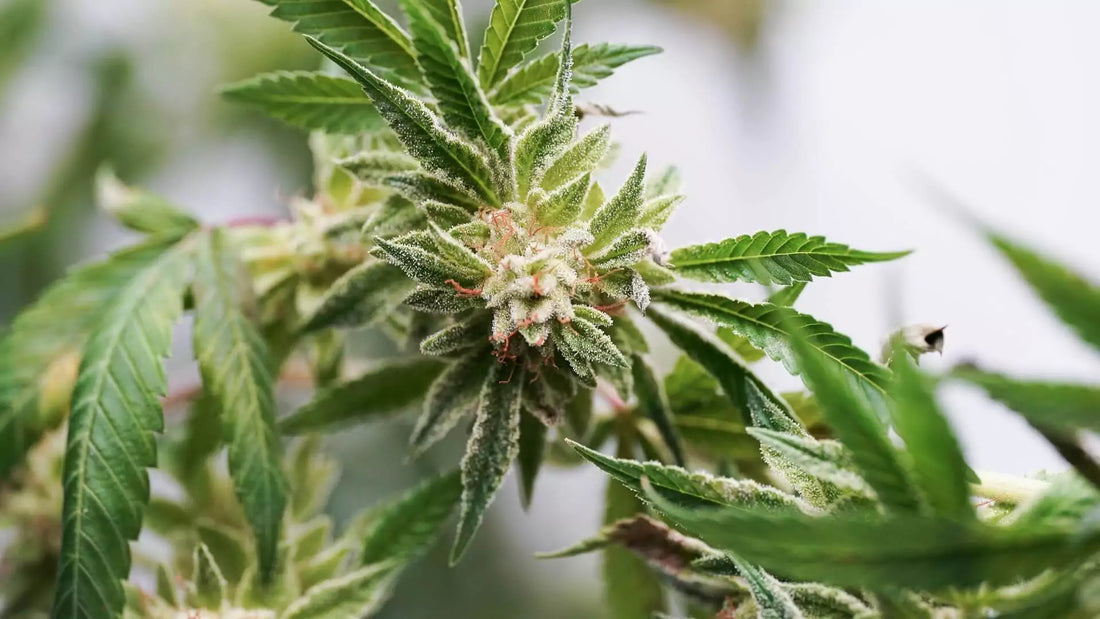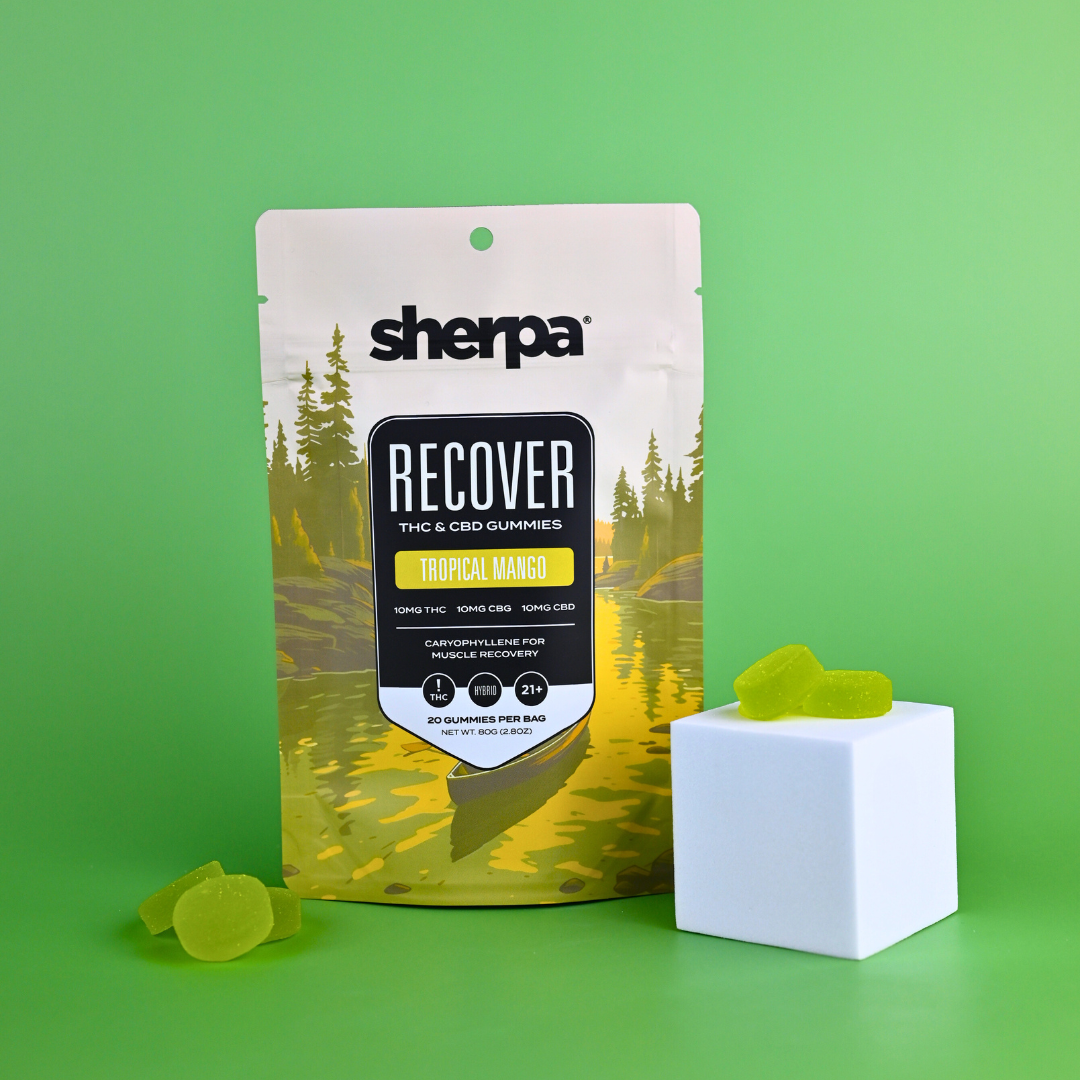
Our Blog
CBN Effects
CBN Effects
Cannabis really is a fascinating plant.
There are quite literally hundreds upon hundreds of different compounds contained in this unassuming plant — compounds that have numerous benefits for your mental health and physical wellbeing. Not to get too woo-woo, but it's probably the closest thing to magic we have access to in our day-to-day lives.
However, we're not here today to talk about the shamanistic properties of this mystical herb. We're actually going to put on our lab coat and take a closer look at the effects of one particular compound found in cannabis — CBN.
Before we can do that though, we first have to understand the class of compounds it belongs to, cannabinoids, and how they interact with your body. So strap in, we're about to get our science on.
Cannabinoids, the Endocannabinoid System, And You
Cannabinoids are the active compounds found in the cannabis plant, and they also play a vital role in how the body processes and responds to various stimuli. There are over a hundred cannabinoids, each with its unique properties and effects. The two most well-known are THC, also called tetrahydrocannabinol by guys with clipboards, and CBD, or cannabidiol, if you're trying to look smart. There are a ton of other cannabinoids like CBN or cannabinol (no "d" in that one) that are gaining attention for their distinct benefits.
Before we talk about that though, we have to talk about how your body interacts with these compounds. Back in the late 80s, it was discovered that the human body had an endocannabinoid system, or ECS for short. It's a complex network of receptors, enzymes, and cannabinoid compounds that help regulate numerous physiological processes, including mood, pain sensation, sleep, and immune response.
The ECS consists of two primary types of receptors: CB1 and CB2. The former are predominantly found in the brain and central nervous system, influencing cognitive functions and motor control, while CB2 receptors are mainly located in your peripheral tissues and are involved in immune system responses.
Are you with us so far? Good. There will be a test at the end. (Not really.)
Alright. When phytocannabinoids — or the cannabinoids found out in the wild — are introduced into the body, they bind to the receptors in the EDS, mimicking the effects of the body's naturally occurring endocannabinoids — the cannabinoids that naturally occur in your body. This interaction helps to maintain your body's balance, or homeostasis for those of you that remember 8th grade science class.
So for example, when THC binds to CB1 receptors, it can help alleviate pain and promote feelings of euphoria. On the other hand, when something like CBD interacts with CB2 receptors, it may contribute to reduced inflammation and immune modulation.
Alright, there's the foundation built. Let's move on and talk about CBN specifically.
What Is CBN, Specifically?
CBN is a unique cannabinoid that has been receiving a lot of attention recently for its potential benefits. Discovered in the late 19th century, CBN is primarily formed when THC oxidizes — essentially, it shows up when THC breaks down due to exposure to air, light, or heat. It's a natural byproduct of the aging process, which means that the cannabis you've had in that jar for three years will likely have a higher concentration of it.
We're going to talk about CBD's effects in detail in just a second, but we'll get our bearings a little by comparing it to two of the most well-known cannabinoids, CBD and THC.
How Does CBN Differ from THC and CBD?
While CBN shares some similarities with THC and CBD, it possesses distinct characteristics that set it apart.
First and foremost, CBN's non-psychoactive nature differentiates it from THC, the primary psychoactive compound in cannabis. The shorter way of saying that is THC will make you high, and CBN won't.
The reason for that is because THC interacts strongly with the CB1 receptors in the brain. This produces a sense of euphoria and altered perception, but CBN does not cause these effects. Instead, users often describe CBN as having a much more subtle and calming influence, making it an attractive option for those looking to unwind without the intoxication associated with THC.
To that end, CBN is sometimes compared to CBD, the more famous non-psychoactive cannabinoid in cannabis known for its potential therapeutic benefits like reducing anxiety and promoting relaxation. While both CBN and CBD support sleep, CBN is more often compared to a sedative, kind of like an all-natural sleeping pill. We'll cover that more in the benefits section.
CBN may also exhibit a different mechanism of action in the body compared to THC and CBD. Emerging research suggests that CBN may target specific receptors in the ECS differently, often enhancing the effects of other cannabinoids in what's commonly called the entourage effect. While THC and CBD are well-studied and have established uses in the wellness community, CBN's unique profile presents exciting opportunities for further research and exploration.
With that in mind, let's take an in-depth look at what we do know about the effects of CBN.
What Are the Effects of Taking CBN?
So like we said, research is still emerging, but early findings suggest that CBN may offer a variety of therapeutic benefits that could enhance overall wellbeing. Probably the most well-understood is its ability to help users sleep better.
Sleep Aid
One of the most commonly reported effects of CBN is that it's a great sleep aid. Unlike THC, which can sometimes lead to vivid dreams or a restless night, CBN has a more calming influence, making it appealing for folks suffering from insomnia or disrupted sleep patterns. Some studies indicate that CBN may also enhance sleep quality, helping users experience more restorative rest. So not only will you be able to fall asleep quicker, you'll sleep better.
If this is what you're looking for specifically, we'd recommend our 2mg microdose sleep pills, or our 5mg nighttime gummies if you really want to zonk out. Those come in two great flavors, too — midnight grape and blue raspberry.
Pain Management
Reports are also showing that CBN may serve as an effective tool for pain management. It's thought that CBN interacts with the body's endocannabinoid system to alleviate the discomfort associated with chronic pain conditions. A lot of users have noted a reduction in pain and a general sense of relief, making CBN a potential option for people dealing with ailments like arthritis or neuropathic pain. These analgesic — or pain-killing — properties are a great alternative for people looking to relieve pain without relying on addictive and dangerous pharmaceuticals.
Immune Support
Another interesting area of CBN's potential effects is its influence on the body's immune system. Early studies suggest that CBN may modulate immune responses, helping to balance the body's inflammatory processes. This modulation could be beneficial for folks with autoimmune disorders or people who are simply looking to support their immune health. Mask up, but also take your CBN? Could help.
Inflammation Reduction
So inflammation has to do with your immune response, but it also is often at the root of various health issues, including chronic pain and certain autoimmune diseases. Research indicates that CBN may possess anti-inflammatory properties, which could make it an effective remedy for inflammation-related conditions. Ultimately, CBN may help improve symptoms and enhance the quality of life for those suffering from these conditions.
Glaucoma Relief
CBN use may also have implications for eye health, particularly in relation to glaucoma. Glaucoma is characterized by increased intraocular pressure — or a swelling inside of your eyeballs — which can lead to vision loss. Some studies suggest that cannabinoids, including CBN, may help lower this pressure, potentially providing relief for people suffering from it. While more research is needed in this area, the prospect of CBN as a supportive measure for glaucoma patients is promising.
Cancer-Fighting Properties
Emerging research has also begun to explore the potential of CBN in cancer treatment. Preliminary studies indicate that many cannabinoids may have anti-cancer properties, and CBN is no exception. Some research suggests that CBN might inhibit the growth of certain cancer cells and help reduce tumor size. While these findings are still in the very early stages, the potential for CBN to contribute to cancer therapies is a pretty exciting avenue for future research.
"Wow," you might be thinking to yourself. "Is there anything CBN can't do?" Well, it's important to temper your expectations. CBN isn't a magic bullet, and there's still a ton of research that needs to be done on its efficacy. There are also a few risks that we should talk about so you can get the full picture.
Risks of CBN Usage
While CBN shows promise as a therapeutic cannabinoid, it's important to be realistic. Understanding the risks associated with CBN can help you make informed decisions about incorporating it into your overall wellness routine.
Limited Research
One of the biggest concerns about CBN is the limited amount of research available. Compared to more widely studied cannabinoids like THC and CBD, CBN has not been as extensively understood. This lack of comprehensive data means we still have much to learn about its long-term safety, potential side effects, and how it interacts with medications. While preliminary findings are encouraging, definitive conclusions about CBN's effectiveness and safety are still a ways off.
Side Effects
Though a lot of people tolerate CBN really well, some could experience mild side effects. Common reports include drowsiness, dry mouth, and changes in appetite. While these effects are generally really mild, they can be disruptive for some folks. Overall, you should avoid taking CBN before tasks that require focus, like driving or talking to your boss, until you understand how it affects you.
Drug Interactions
It's very possible that CBN may interact with other medications, particularly those metabolized by the liver. For the doctors out there, cannabinoids can affect the cytochrome P450 enzyme system, which is responsible for metabolizing a lot of common pharmaceuticals. If you're taking other medications, especially sedatives or blood thinners, it's important to consult with a healthcare professional before starting CBN.
Overconsumption Risks
As with any substance, taking too much CBN can lead to bad outcomes. While CBN is non-psychoactive — meaning it will not produce a "high" like THC — excessive consumption may still lead to pretty severe drowsiness or even discomfort. Starting with a low dose and gradually increasing it can help you gauge your tolerance and find an optimal dosage that works for you.
Individual Variability
It's also important to understand that individual responses to cannabinoids can vary significantly. Factors such as genetics, metabolism, and existing health conditions all play a role in how CBN may affect you. What works well for one person might not have the same effect on another. Just because it helped your mom sleep better doesn't mean it's going to do the same for you — everybody's body is different after all.
So now that you have a pretty good idea of the pros and cons of CBN, let's talk about how to incorporate it into your day-to-day safely and effectively.
Tips on Using CBN
Any time you introduce a new substance to your life, you're going to want to take the time to really understand it and how it's going to impact you. You want to be mindful of how you're using it and intentional about the results you're looking for. To that end, here are some recommendations for getting the most out of CBN.
Consult with a Healthcare Professional
This is the most important one. If you're considering adding CBN to your wellness routine, especially if you're taking other medications or have underlying health conditions, you really need to consult with a healthcare professional. They can provide personalized guidance based on your health needs and help you navigate any potential negative interactions.
Start Slow
One of the golden rules when trying any new cannabinoid is to start with a low dose. CBN can affect individuals differently, and beginning with a small amount allows you to assess your body's response without overwhelming yourself. Make sure to gradually increase the dosage as needed, giving your body time to adjust. This slow-walk approach helps you find your optimal dosage while minimizing the risk of side effects you don't want.
Choose the Right Product
CBN is available in a lot of different forms, including oils, tinctures, capsules, and edibles. Each method of consumption offers different benefits and onset times. For example, tinctures taken sublingually — meaning under the tongue — may provide faster relief compared to edibles, which can take longer to kick in. Think about your specific needs and choose a product that aligns with them. Also make sure you're getting your CBN from a reputable source like Sherpa. The cannabis industry is a little like the wild west right now, so you want to get your products from people you trust.
Time Your Doses
The timing of when you take your CBN can really impact its effects. If you're using CBN to help with sleep, consider taking it about 30 minutes to an hour before bedtime. For daytime use, especially if you're aiming to reduce anxiety, experiment with different times to see what works best for you. Maybe you need it in the morning to get over the pre-work jitters or maybe you'd prefer to take it to wind down at the end of the day. Monitoring how CBN affects your alertness and overall mood throughout the day can help you fine-tune your schedule.
Keep a Journal
It sounds a little funny, but tracking your experiences can be really valuable in understanding how CBN is affecting your life. Consider keeping a journal or a spreadsheet to note your dosage, the time of day you took it, and any effects you experienced — positive or negative. This record can help you identify patterns over time and make better decisions about how you use cannabis in the future.
Listen to Your Body
Finally, you should always listen to your body. If you experience any adverse effects or feel uncomfortable, adjust your dosage or stop using CBN altogether. Each person's experience with cannabinoids is unique, so prioritizing your wellbeing is critically important in this journey.
Final Thoughts on CBN
As really smart people continue to explore the complexities of cannabinoids, it's clear that CBN stands out for its unique profile and its potential benefits. While more rigorous research is needed to fully unlock its capabilities, the initial findings are really encouraging. For anyone curious about the therapeutic potential of cannabis, CBN is definitely one worth considering.
Whether you're looking to improve your sleep, manage pain, or simply explore the gentler, more grounded side of cannabis, CBN could be the key to discovering a new level of tranquility and health. We'd encourage you to take the time to understand your body, talk to it, find out what it needs, and learn what works best for you.




